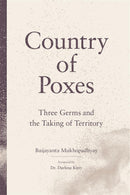Description
Country of Poxes is the story of land theft in North America through three diseases: syphilis, smallpox and tuberculosis. These infectious diseases reveal that medical care, widely considered a magnanimous cornerstone of the Canadian state, developed in lockstep with colonial control over Indigenous land and life. Pathogens are storytellers of their time. The 500-year-old debate over the origins of syphilis reflects colonial judgments of morality and sexuality that became formally entwined in medicine. Smallpox is notoriously linked with the project of land theft, as colonizers destroyed Indigenous land, economies and life in the name of disease eradication. And tuberculosis, considered the “Indian disease,” aroused intense fear of contagion that launched separate systems of care for Indigenous Peoples in a de facto medical apartheid, while white settlers retreated to sanatoria in the Laurentians and Georgian Bay to be cured. In this immersive and deeply reflective book, physician and activist Dr. Baijayanta Mukhopadhyay provides riveting insights into the biological and social relationships of disease and empire. Country of Poxes considers a future of health in Canada that heeds redress and healing for Nations brutalized by the Canadian state.
Foreword by Dr. Darlene Kitty, Cree, who is a family physician working in northern Quebec and who shares the Knowledge of Indigenous health and approach to culturally safe care.
Baijayanta Mukhopadhyay is a Bengali settler living in Tio’tia:ke for over two decades. A family doctor who serves primarily in Eeyou Istchee, Baijayanta also works in Treaty 3 and 9 territories, as well as with undocumented migrants, unhoused people and queer/trans youth in the city. He is clinical faculty at the McGill Department of Family Medicine, focusing on supporting rural/low-resource practice. Mukhopadhyay also organises around issues related to extractivism, migrant rights, policing, public services and decolonizing global health within local and international networks and collectives.


